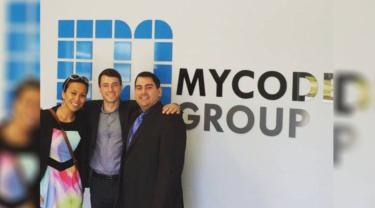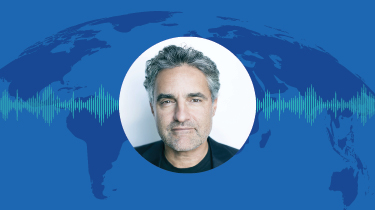When David Brown moved back to his hometown of Fredericton, New Brunswick after finishing his biochemistry degree at the University of Alberta, he was so committed to his business idea that he spent a summer living in a tent in Grand Falls, two hours north of the capital.
“I had this idea, but I had no money to do anything with it,” said Brown. “And I didn’t have a lab. So I applied for a loan from Futurpreneur, an organization that supports young entrepreneurs. They also give you business mentorship.”
With the loan proceeds, he found a lab in Grand Falls and, in order to “stretch every penny,” he spent the summer living in a campground wedged between two potato fields. At the lab that summer, he was able to establish a “proof of concept” that showed that they could produce a biopolymer called chitosan from white button-mushroom fungus and do it in a way that pharmaceutical companies, which are sticklers for consistent and reliable supplies, would buy.
Traditionally, chitosan comes from crustaceans and pharmaceutical companies, though they had research indicating they could make life-changing drugs with it, shied away from it because our oceans are so polluted with arsenic and mercury that it shows up in shellfish. In addition, five per cent of humans are deathly allergic to shellfish and there’s a fear the proteins could carry over to their drugs.
“It’s all about trust with the pharmaceutical companies,” Brown said. “They’ll only use ingredients that are consistent batch to batch and that have a high degree of purity.”
Once he proved he could produce it, he pitched the idea to some investors and it snowballed from there. That was five years ago. Today, he’s a founder of one thriving N.B.-based company and the co-founder of a second one. And in May, he received a Governor General’s innovation award.
Mycodev Group, which has seven employees, uses its technology to ferment and produce fungal-based chitosan. Chinova Bioworks’ four employees take Mycodev’s chitosan and apply their own technology to make it an effective preservative for food, beverages and cosmetics.
“Chitosan is on a broad spectrum,” Brown explained.
At the bottom, it has uses in wastewater treatment and agriculture. At the top, it can be used in medical devices for brain surgery. With high-end medical devices, the consistency and purity of the ingredient is essential.
“One of our clients uses it to stop bleeding and to stop cerebral spinal fluid from leaking during brain surgery,” Brown said. “We just supply the ingredient.”
Brown now concentrates on Chinova Bioworks, which he founded a year ago after doing a project with a former professor.
“We discovered it’s a really good anti-microbial, and with the clean label trend — where people want to understand all the ingredients in their products — mushroom chitosan is a really good preservative. Many companies need to be ‘clean label’ but when you’re shipping juices, for example, around the world, you need a preservative or it’ll spoil quickly.”
Today, they’re working to test the ingredient with two of the world’s big food service companies and also a cosmetic company.
Brown said he returned to Fredericton to be closer to his family and because he wanted to help solve New Brunswick’s financial problems.
“One company can’t do that, but I hope we play a role,” said Brown, who, at just 27 years old, is already paying it back by mentoring young would-be entrepreneurs.
From the start, Brown knew he’d have to export his products.
“The United States is the big market,” he said. “Most of our clients have been in the U.S. But we are getting into some other areas — Japan is one for Chinova.”
While he hasn’t yet used EDC’s financial services, he’s attended several EDC-hosted events.
“Those events are great because they’ve given us detailed information about the exporting process,” he said. “It’s complicated for biotech. We make a white powder and we have to ship that across borders. As we grow, we’ll need more of EDC’s services.”
His latest foray into Japan gives promise for more markets coming online soon.
“We have potential clients all over the world,” he said, adding that he’s been to Brazil recently. “Our major projects with large food companies are a gateway.”





